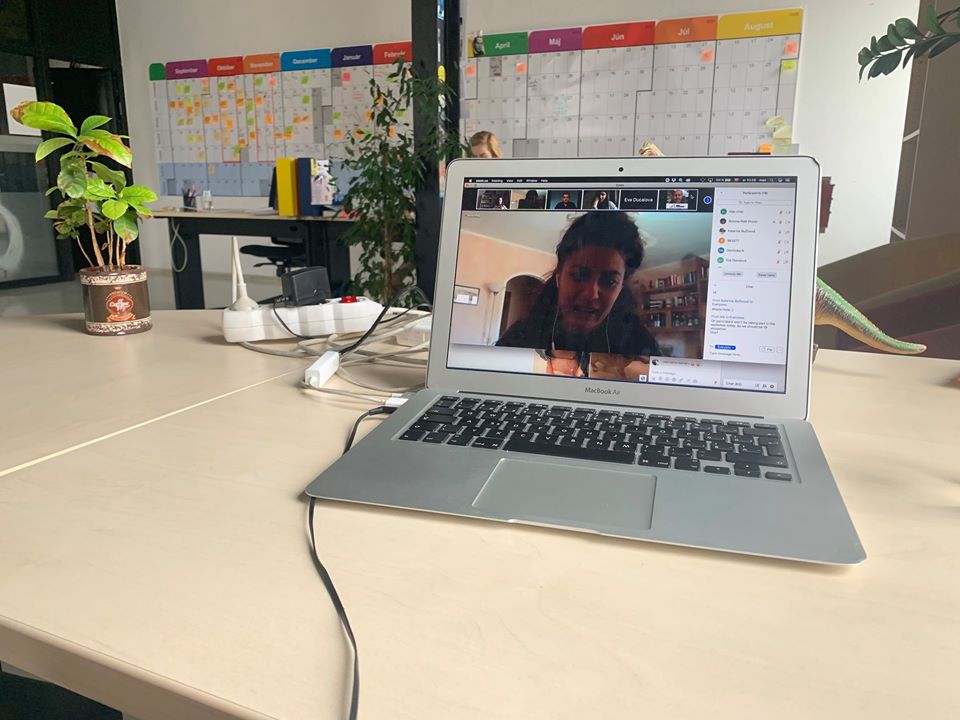Košice was ready to host the last TraCEs Co-Creation Tlab in march. What the organisation didn’t expect is a pandemic to come and a general European lockdown interfering in the celebration of such an expected event. The format of the workshop had to be adapted in the blink of an eye to a digital perspective, and it finally took place on the 11th and 12th of March as a webinar.

Michaela Halász, project manager at Creative Industry Košice (CIKE), explains: “At the beginning, we were a little bit sceptical about a possibility to host the T-Labs online as we were not exactly sure if it can deliver the same experience as organising a co-creation workshop in person. However, we were very pleasantly surprised by how it all worked out. For most of us, it was the first time using Zoom, but obviously not the last one since we managed to have a presentation all together, create separated working “rooms” where we worked in teams and it all worked out much better than we expected”.
As Halász confirms, it was a satisfactory experience that helped to learn about different ways of working together and communicating during the lockdown. “It was not beneficial only on a tourism level, but it had an added value on learning new possibilities for cooperation and communication in the times of crisis”, the project managers told.
Eventually, the webinar was attended by 20 selected participants who were keen to create transformative tourism experiences and trips around Slovakia. The session was led by the trainer and travel product development expert, Simona Polli, from her home in Italy. These participants had different backgrounds, they were tourist board members, small incoming agencies, tourism students, tour guides, service providers, university teachers from tourism department, members of the creative scene, etc, and T-Labs connected all these people who share the same goals in the tourism industry.
“Tourism definitely gives many local people new business opportunities. Through providing transformative experiences they can share their values, culture, skills, ideas with the travellers and inspire them in a good way, influence their future by new insights, motivate them to be more respectful towards nature, culture, etc.”, explains the project manager at CIKE. Considering this framework, T-labs gave ideas to the participants about new products, activities and business opportunities. Even, as Michaela Halász points out: “teachers from the university can now include this topic into their teaching structures for future professionals in tourism industry who then will be aware of this term”.

As it was expected, the TLab brought up different proposals to implement Transformative Tourism in the current Košice’s touristic offer. Some of the proposals were a Creativity Booster for women, a product called ‘Expect the Unexpected‘, which focuses on surprise factors and experiencing unexpected activities. There was also a product focused mainly on discovering unknown places that only local people know, as well as focusing on sustainable transfer options between different activity locations, such as hiking, biking or canoeing. The last project was a suggestion of a multi-day crossing of Hungary, Slovakia and Poland on horses or bicycles with a personal guide on a trail over 300km long.
All these proposals are being now analysed and soon one of them will become real as a Cultour is Captial next action. It is yet to come, but what it is for sure is that the chosen one will be an example of the connection between tourism and creativity, because as Halász says: “creativity and tourism complement each other perfectly, it raises the appeal of the destination. What people want is an emotion, not just passively look out through the windows of the bus or windows of the hotel room. Creative tourism is nowadays considered as a new kind of tourism, people are not interested to be only passive tourists, they want to feel like a local, experience every-day local life, they want to be involved in the local scene through different creative activities, such as workshops, classes, co-creations, performances… it gives them a better opportunity to interact with locals and meet new like-minded people and leave the country with new connections, new skills and new experiences. That will always make them feel connected to the destination. It deepens the connection between the traveller and the visited place much more than being a passive tourist”.
